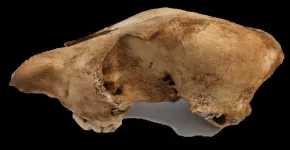Researchers find common immune system mechanism between pregnancy, cancer
By understanding how the immune system is suppressed in pregnancy, researchers pinpointed a key mechanism that stops the immune system from blocking cancer
2024-07-08
(Press-News.org)
For more information, contact:
Nicole Fawcett, nfawcett@umich.edu
734-764-2220
For immediate release
ANN ARBOR, Michigan — To understand why some cancers successfully circumvent the immune system to grow unchecked, researchers turned to pregnancy.
“In pregnancy, the immune system does not reject the growing fetus, so we know there must be mechanisms active in the placenta. In cancer, it’s the same thing: the growing tumor is not rejected by the immune system. It means the cancer cells have developed strategies to suppress immune rejection, same as in pregnancy,” said Weiping Zou, M.D., Ph.D.
It’s a good thing in pregnancy – it allows the baby to grow. But in cancer, it means the tumor grows unchecked and treatments meant to stimulate an immune response are not effective.
To understand this overlap, Zou collaborated with other researchers from the University of Michigan Rogel Cancer Center – bringing together unique expertise in immunology, cancer genetics, gynecologic pathology and medicinal chemistry.
They found that indeed there is a molecular mechanism shared in cancer and pregnancy that suppresses the immune system. Block this mechanism, called B7-H4, and the immune system revs up to slow cancer’s growth. Looking at mouse models and cell lines of breast and gynecologic cancers, the researchers identified the hormone progesterone as a key regulator of the B7-H4 immune checkpoint.
The paper is published in Cell.
B7-H4 expression has previously been associated with shorter survival in cancer patients. The Rogel researchers discovered that B7-H4 plays an active role in moderating the immune system in both the placenta and the tumor microenvironment.
Further, while the male hormone androgen has previously been linked to immune suppression in prostate cancer, this is the first time the female sex hormone progesterone has been shown to impact immune response in cancer.
Researchers used an inhibitor to block progesterone signaling in mice with breast cancer and in human breast cancer tissue samples, which did slow the cancer’s growth in mice and activated the immune response. The effect was clear but not dramatic, however.
“B7-H4 is an important checkpoint, but it’s complicated,” Zou said. “Progesterone regulation is one mechanism, but we need more studies to understand whether other mechanisms are also involved in regulating B7-H4. We do not have a direct way to block this signaling pathway. The receptors remains unknown. There’s something in the basic immunobiology that we still don’t understand.”
Researchers plan additional studies looking at mechanisms regulating B7-H4 protein stability, as well as the role other factors plays in cancer immunology.
Additional authors: Jiali Yu, Yijian Yan, Shasha Li, Ying Xu, Abhijit Parolia, Syed Rizvi, Weichao Wang, Yiwen Zhai, Rongxin Xiao, Xiong Li, Peng Liao, Jiajia Zhou, Karolina Okla, Heng Lin, Xun Lin, Sara Grove, Shuang Wei, Linda Vatan, Jiantao Hu, Justyna Szumilo, Jan Kotarski, Zachary T. Freeman, Stephanie Skala, Max Wicha, Kathleen R. Cho, Arul M. Chinnaiyan, Samantha Schon, Fei Wen, Ilona Kryczek, Shaomeng Wang, Lieping Chen
Funding for this work is from National Cancer Institute grants CA217648, CA123088, CA099985, CA193136, CA152470, CA46592; UTC-Yale Endowment
This work was supported by these Rogel Cancer Center Shared Resources: Immune Monitoring, Transgenic Animal Models, Cell and Tissue Imaging
Disclosure: None
Paper cited: “Progestogen-driven B7-H4 contributes to onco-fetal immune tolerance,” Cell. DOI: 10.1016/j.cell.2024.06.012
Resources:
University of Michigan Rogel Cancer Center, www.rogelcancercenter.org
Michigan Health Lab, www.MichiganHealthLab.org
Michigan Medicine Cancer AnswerLine, 800-865-1125
# # #
END
ELSE PRESS RELEASES FROM THIS DATE:
2024-07-08
UC San Diego Health is the first health system in San Diego County to offer a new bladder-saving gene therapy to treat localized bladder cancer.
The novel treatment is the first and only FDA-approved gene therapy delivered directly into the bladder for non-muscle-invasive bladder cancer (NMIBC). Called nadofaragene firadenovec (Adstiladrin), the gene therapy addresses an unmet need for patients who are no longer responding to the longstanding first line of defense — bacillus calmette-guerin (BCG), a bacteria-based immunotherapy for cancer management. While BCG is a common first therapy, it can eventually stop working, ultimately leading to complete bladder removal.
The American ...
2024-07-08
July 8, 2024, Mountain View, CA – Today, the SETI Institute announced the first projects it will fund with a new program to Support Technology, Research, Innovation, Development, and Education programs – or STRIDE. The SETI Institute established the $500K STRIDE fund for SETI Institute researchers and EOC (Education, Outreach, and Communications) professionals to develop innovative research and education proposals. The first five grants awarded will support projects that:
analyze Earth’s colors and climate to create detectors for studying exoplanets
develop a multi-backend capability for ...
2024-07-08
The human body’s inability to break down sucralose, an artificial sweetener found in many zero-calorie food and drink products, is well established by scientific research. The compound is so stable that it escapes wastewater treatment processing and is in drinking water and aquatic environments.
“We can't break down sucralose, and a lot of microorganisms can't break it down, either, because it's a really tough molecule that doesn't degrade easily. So there are a lot of questions about how it is affecting the environment ...
2024-07-08
DNA from fossilised dingo remains going back 2746 years compared with modern dingoes’
Dingos arrived in Australia more than 3000 years ago
K’gari dingoes have no domestic dog ancestry – they are pure dingo
Co-lead author, paleogeneticist Dr Sally Wasef, from QUT’s School of Biomedical Sciences said this dataset gave a rare glimpse into the pre-colonial genetic landscape of dingoes, free from any mixing with modern dog breeds.
“Consequently, are behaviourally, genetically, and anatomically distinct from domestic dogs,” Dr Wasef said.
“Modern-day dingoes’ ancestors arrived in Australia more than 3000 years ...
2024-07-08
NEWPORT NEWS, VA – Jefferson Science Associates, LLC, today announced that Kim Sawyer will become the new director of the U.S. Department of Energy’s Thomas Jefferson National Accelerator Facility, effective Aug. 2.
Sawyer will serve as the lab’s fifth director in its 40-year history. In this role, Sawyer will be responsible for leading all activities in support of the world’s premiere research institution for exploring the nature of matter.
“We are pleased that Kim has been selected to lead Jefferson Lab,” said ...
2024-07-08
Disparities in cardiovascular disease outcomes between urban and rural areas continue to widen, yet nearly half of U.S. counties do not have a practicing cardiologist. According to a new analysis published in JACC, the flagship journal of the American College of Cardiology, these counties tend to be more rural and socioeconomically disadvantaged, with a greater burden of cardiovascular disease, thus highlighting deep geographic disparity in access to cardiovascular care.
“While cardiologists are not the only determinants of cardiovascular outcomes, the lack of access to cardiologists in areas with ...
2024-07-08
Hospital-level care provided in a patient’s own home is appealing to a majority of people for its convenience, comfort and effectiveness, according to a USC Schaeffer Center study.
The study, published in JAMA, found that most survey respondents felt they would recover faster if cared for at home, rather than in the hospital, and that they felt safe being treated at home.
Researchers say their study provides important insights about patient and family preferences as policymakers weigh whether to extend ...
2024-07-08
KEY TAKEAWAYS
In a study involving 50,000+ individuals from around the world, higher gut levels of Blastocystis, a single-celled organism commonly found in the digestive system, were linked to more favorable indicators of health.
People with a healthy diet had higher levels of Blastocystis.
The study, which was conducted by an international team led by investigators at Massachusetts General Hospital, suggests that Blastocystis may play a beneficial role in how diet impacts health.
In an analysis of more than 50,000 individuals from around the world, carriers of gut Blastocystis, a single-celled organism that has been ...
2024-07-08
David Luther, Associate Professor, Biology, received funding for the project: “Identifying Road Segments that Bisect Predicted Movement Corridors for Small Priority Species in Virginia.”
The purpose of this study is to advance the work of the legislated Wildlife Corridor Action Plan (WCAP) and meet the intent of an awarded Federal Highway Administration (FHWA) grant by identifying road segments that may pose a high risk or impede movement of select small terrestrial and semiaquatic animal species that are ...
2024-07-08
ITHACA, N.Y. - Organizations using AI to monitor employees’ behavior and productivity can expect them to complain more, be less productive and want to quit more – unless the technology can be framed as supporting their development, Cornell University research finds.
Surveillance tools cause people to feel a greater loss of autonomy than oversight by humans, according to the research. Businesses and other organizations using the fast-changing technologies to evaluate employee behaviors should consider their unintended consequences, which may prompt resistance and hurt performance, the researchers say. They also suggest an opportunity to win buy-in, ...
LAST 30 PRESS RELEASES:
[Press-News.org] Researchers find common immune system mechanism between pregnancy, cancer
By understanding how the immune system is suppressed in pregnancy, researchers pinpointed a key mechanism that stops the immune system from blocking cancer






